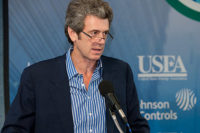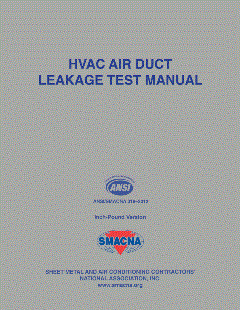
Charles O. Holliday, chairman of Bank of America, and former chairman and CEO of DuPont, urged, “Do those energy efficiency projects right now. They make sense. They’re proven.” while speaking at the North American Energy Efficiency Forum co-sponsored by Johnson Controls and the United States Energy Association. (Photo: Herman Farrer Photography.)
WASHINGTON - The theme of the 22nd annual North American Energy Efficiency Forum was “Energy Efficiency: The Smart Path to Energy Security and Economic Growth” and speakers addressed the importance of pursuing energy efficiency and alternative energy sources not only to reduce energy costs but also enhance national security.
Sen. Jeff Bingaman, D-N.M., chairman of the Senate Energy and Natural Resources Committee, noted that it’s proving difficult to get a lot of things done in the current Congress. One area where he believes Congress can make progress is on energy.
“Energy always becomes an issue when the price of gas goes up,” he said.
Bingaman pointed out that investment in clean energy reached a quarter of a trillion dollars worldwide in 2010, about a 100 percent increase since 2006. “Most of the new investment in clean energy around the world is taking place outside the United States, unfortunately.”
Other countries are also implementing policies to become more energy efficient, he said. So how should the U.S. respond?
Bingaman said there are four major things the United States needs to do:
1.Continue to lead the world in energy research and development;
2.Ensure a strong domestic market for clean energy technologies;
3.Put in place the financial infrastructure and incentives to deploy high efficiency and clean energy products and equipment; and
4.Have clear policies promoting high efficiency and clean energy technologies.
At the event, co-sponsored by Johnson Controls and the United States Energy Association, Johnson Controls also took the opportunity to announce the results of its fifth annual Global Energy Efficiency Indicator survey.
PASSIONATE ABOUT ALTERNATIVE ENERGY
Rep. Charles F. Bass, R-N.H., a member of the House Energy and Commerce Committee, stated emphatically, “I am passionate about alternative energy development.”He said there are no oil wells in New Hampshire. There are no coal veins. “We need to have an energy plan for this nation that addresses states like New Hampshire and Maine and others where 86 percent of our consumption is in heating oil.”
Bass said he is trying to move the House Energy and Commerce Committee in a more comprehensive direction, and he is working on an energy bill in the House that would be workable. However, with the current debt, he said, it’s going to be very difficult to move any legislation that increases spending. So he is developing a bill that eliminates mandates and spends as little money as possible.
Alternative energy is truly a mature industry now, said Bass. “We’ve reached that critical mass in solar, in wind, possibly in biomass, and most importantly in energy efficiency.”

“We need to have an energy plan for this nation that addresses states like New Hampshire and Maine and others where 86 percent of our consumption is in heating oil,” Rep. Charles F. Bass said. (Photo: Herman Farrer Photography.)
As the price of energy has gone up, he said, those projects have returned much more than 12 percent. “So the lesson is to put a bias in your company and I do not think you will regret that.”
Holliday added, “Do those energy efficiency projects right now. They make sense. They’re proven.”
Gary Doer, Canadian ambassador to the United States, said that energy efficiency has “tremendous benefits for consumers. It has tremendous benefits for the ability to innovate and create more business opportunities.” In addition, he said, “It has tremendous benefits for national security.”
When Doer was premier of the province of Manitoba, his government’s retrofit program for buildings and homes helped reduce electrical use for the province. “We also sold that power we weren’t using to our American friends at very, very reasonable prices.”
Regarding the U.S./Canada relationship, “We know there will be a greater demand for oil from Canada,” he said. The United States will likely look for a greater percentage of its oil from Canada and less from the Middle East. He noted that a recent U.S. Department of Energy report stated that reducing oil from the Middle East is an important component of energy security in the United States.
So energy efficiency from Canada’s oil sands is important, Doer said. And Canada must improve in all areas of energy sustainability. “We look forward to continuing to innovate with our knowledge economy and energy efficiency, together.”

“Changing the way that we use, produce, and acquire energy is fundamentally about national security,” said Ray Mabus, U.S. Secretary of the Navy. (Photo: Herman Farrer Photography.)
ENERGY EFFICIENCY SAVES LIVES
U.S. Secretary of the Navy Ray Mabus leads both the Navy and Marine Corps. The topic of his presentation was how energy efficiency helps save lives.In the military, you not only look at the vulnerabilities of your adversaries, “you look at your own vulnerabilities,” he said. “And energy is a vulnerability.”
Mabus said, “We buy energy from either potentially or actually volatile places on Earth.” That gives the countries from which we buy energy a say in whether our ships sail, whether our aircraft fly, and whether our ground vehicles operate.
The military has to have flexibility to move quickly from one mission to another, he said, from warfare to disaster relief to humanitarian relief to other missions.
“Changing the way that we use, produce, and acquire energy is fundamentally about national security,” said Mabus. “It is fundamentally about energy independence.”
The increase in oil prices this year added $562 million in additional costs for the Navy and Marine Corps, he said. “We don’t have that sort of money to spare.”
Because of the price shocks and the tactical and strategic implications, the U.S. Navy has a goal that, no later than 2020, at least half of all energy used will come from non-fossil fuels.
Mabus said some people have told him that this goal is too aggressive. But, he said, the Navy has been at the forefront of pioneering new sources of energy for 150 years. It has gone from sail to coal to oil to nuclear. “Every single time there were folks who said you are trading one absolutely certain type of energy for one that you don’t know is going to work.” But every single time the naysayers were wrong.
In energy, said Mabus, the U.S. Navy and Marine Corps are going to “innovate, evolve, change, overcome, and emerge victorious on the other side.”

“Green building has reached a tipping point,” noted C. David Myers, president, Building Efficiency, Johnson Controls. (Photo: Herman Farrer Photography.)
ENERGY EFFICIENCY INDICATOR
C. David Myers, president, Building Efficiency, Johnson Controls, presented an overview of the results of the latest Global Energy Efficiency Indicator (EEI) survey, conducted by Johnson Controls, the International Facility Management Association (IFMA), and the Urban Land Institute.Over the five years of the EEI, said Myers, more and more respondents are saying that “energy efficiency is a key area of our decision criteria.”
Regarding the key drivers for making energy efficiency improvements, No. 1 is energy cost savings and No. 2 is government/utility incentives and rebates. These were at the top globally and in the United States/Canada.
“Green building has reached a tipping point,” Myers said. Last year, 19 percent of respondents had at least one green-certified building. This year, 37 percent have a building that is green-certified. In addition, another 32 percent have green elements incorporated into their buildings.
The primary barrier to efficiency improvements is the “availability of capital to implement them,” Myers said. Another major barrier is the inability of projects to meet financial payback criteria.
Solutions to overcome barriers are:
1.Establish energy reduction goals;
2.Frequent analysis of energy data;
3.Add resources through hiring, repurposing, or retraining, or seek consultants;
4.Use external financing for projects.
In summary, said Myers, the EEI survey shows there is “broad movement in markets around the world toward greater energy efficiency”; there are “clearly obstacles in the path” and “pitfalls that must be overcome”; and there are common success factors to facilitate improvements.
Publication date:07/18/2011






